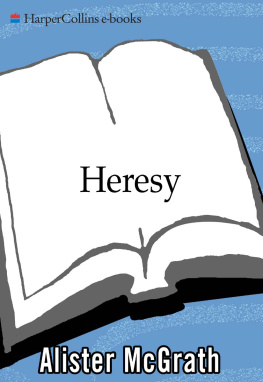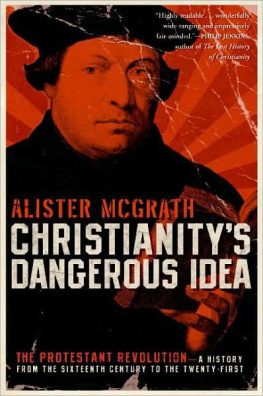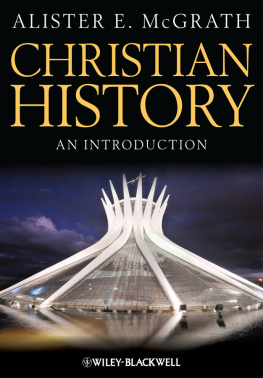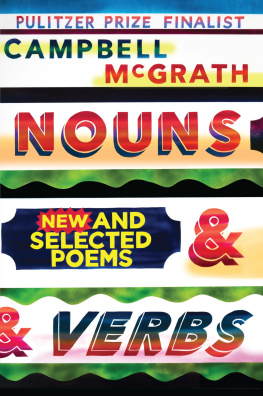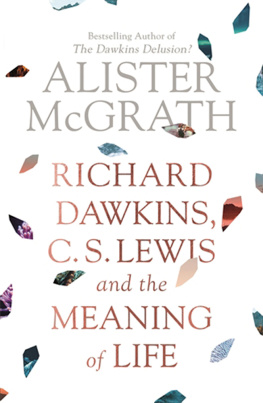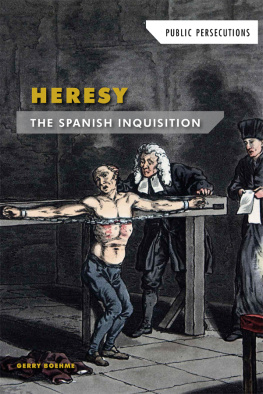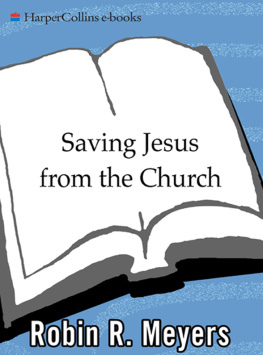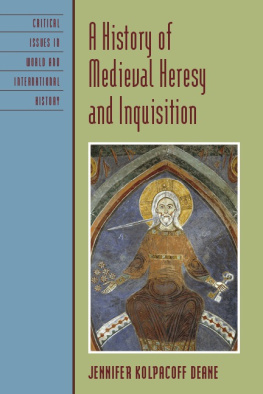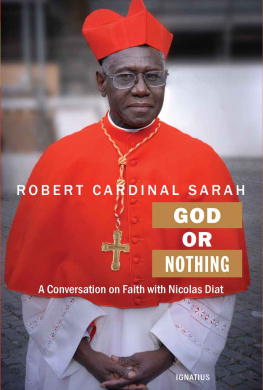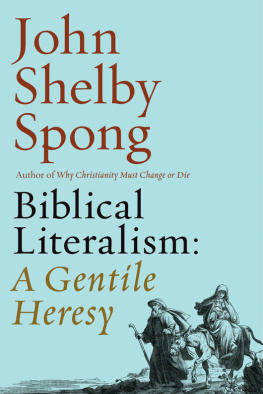McGrath - Heresy
Here you can read online McGrath - Heresy full text of the book (entire story) in english for free. Download pdf and epub, get meaning, cover and reviews about this ebook. year: 2018;2009, publisher: HarperCollins, genre: Religion. Description of the work, (preface) as well as reviews are available. Best literature library LitArk.com created for fans of good reading and offers a wide selection of genres:
Romance novel
Science fiction
Adventure
Detective
Science
History
Home and family
Prose
Art
Politics
Computer
Non-fiction
Religion
Business
Children
Humor
Choose a favorite category and find really read worthwhile books. Enjoy immersion in the world of imagination, feel the emotions of the characters or learn something new for yourself, make an fascinating discovery.
Heresy: summary, description and annotation
We offer to read an annotation, description, summary or preface (depends on what the author of the book "Heresy" wrote himself). If you haven't found the necessary information about the book — write in the comments, we will try to find it.
Heresy — read online for free the complete book (whole text) full work
Below is the text of the book, divided by pages. System saving the place of the last page read, allows you to conveniently read the book "Heresy" online for free, without having to search again every time where you left off. Put a bookmark, and you can go to the page where you finished reading at any time.
Font size:
Interval:
Bookmark:
ALISTER E. M C GRATH is a historian, biochemist, and Christian theologian born in Belfast, Northern Ireland. A longtime professor at Oxford University, he now holds the chair in theology, ministry, and education at the University of London. He is the author of several books on theology and history, including Christianitys Dangerous Idea, In the Beginning , and The Twilight of Atheism . He lives in Oxford, England, and lectures regularly in the United States. Visit the author online at www.harpercollins.com/AlisterMcGrath.
Visit www.AuthorTracker.com for exclusive information on your favorite HarperCollins author.
Australia
HarperCollins Publishers Australia Pty. Ltd.
Level 13, 201 Elizabeth Street
Sydney, NSW 2000, Australia
www.harpercollins.com.au
Canada
HarperCollins Publishers Ltd
Bay Adelaide Centre, East Tower
22 Adelaide Street West, 41st Floor
Toronto, Ontario, Canada
M5H 4E3
www.harpercollins.ca
India
HarperCollins India
A 75, Sector 57
Noida
Uttar Pradesh 201 301
www.harpercollins.co.in
New Zealand
HarperCollins Publishers New Zealand
Unit D1, 63 Apollo Drive
Rosedale 0632
Auckland, New Zealand
www.harpercollins.co.nz
United Kingdom
HarperCollins Publishers Ltd.
1 London Bridge Street
London SE1 9GF, UK
www.harpercollins.co.uk
United States
HarperCollins Publishers Inc.
195 Broadway
New York, NY 10007
www.harpercollins.com
Morality, like art, means drawing a line somewhere (Oscar Wilde). This book has explored the idea of heresy within the Christian tradition, trying to understand at least something of its nature and originsabout how theological lines had to be drawn, and came to be drawn, between the realms of orthodoxy and heresy. It does not set out to offer any new insights into individual heresies, but tries to distill and collate a significant body of academic research into the phenomenon of heresy, using certain heresies as case studies to illustrate points of importance. And while this exploration is undoubtedly of academic interest, its real significance lies in its implications for the life of the church. In bringing this book to a close, we therefore turn away from the great scholarly questions of the nature and origins of heresy, to consider, however briefly, its contemporary significance for Christian communities.
Some have suggested that heresy is essentially an outmoded idea, with little or no relevance to modern church life. Even a casual reading of recent writings on the early church indicates that there has been a persistent intensifying of skeptical presumptions concerning the contemporary legitimacy and utility of the notion of heresy. It is widely held that it reflects the concerns and agendas of long-bygone eras in the history of the church, and can safely be discarded. However, the analysis offered in this work indicates that this is simply not correct, primarily for two reasons.
First, the pursuit of orthodoxy is essentially the quest for Christian authenticity. The relentless attempt to find the best formulations of Christian truth claims reflects the insight that Christianity is capable of stating and understanding its ideas inadequately and inauthentically. In a fiercely competitive religious and cultural context, Christianitys future existence and prosperity will depend upon its presenting itself in its most authentic forms. To put it somewhat bluntly and pragmatically, defective and damaging forms of the Christian faithin other words, heresieswill limit its survival prospects. The quest for orthodoxy is above all a search for authenticity.
Secondly, heresies, like history, have a habit of repeating themselves. The historian may treat Gnosticism as a complex intellectual and cultural movement of late classical antiquity, raising some interesting questions for academic historians yet perhaps not for anyone else. However, those who are concerned about the relationship of Christianity and modern culture see a somewhat different picture. Gnosticism lives on today, not necessarily knowing its real name or even its history. Yet its spoor is unmistakable. Its echo is heard today in those who interpret Christianity as a religion of self-discovery, not redemption. Religion is the quest for true inner identity, the real me, the inner spark of divine life, or the gold in the mud. The challenge faced by the churches is whether they can counter such cultural stereotypes rather than inadvertently reinforcing them.
The new interest in heresy so characteristic of the late twentieth and early twenty-first centuries goes far beyond the renewal of scholarly interest in a neglected or misunderstood phenomenon of the past. Indeed, some have suggested that modern scholarship in this area is not simply enamored of ancient heresies but practices historical advocacy at the expense of even-handed history. There is no doubt, for example, that many recent scholars have advocated Gnosticism as a congenial alternative to what they regard as the failings and vices of traditional Christianity. Elaine Pagels, for example, clearly regards Gnosticism (or at least certain forms of it) as more egalitarian than Christian orthodoxy. As we have seen, this is a highly problematic reading of the situation. Yet while such stereotypes can be challenged by historical scholarship, the underlying perception persists. Indeed, for many the perception has become the reality. It needs to be challenged and corrected.
The lure of the religious forbidden can be accounted for, at least to some extent, on social psychological grounds. Was it so surprising that people concluded that God was dead when the supposed communities of his habitation were so dreary and uninteresting?
Yet the real challenge faced by the churches cannot be neutralized by the demonstration that theological orthodoxy is both necessary and appropriate for the well-being of Christian communities. the distinction between orthodoxy and heresy ought to have significant imaginative implications. The real challenge is for the churches to demonstrate that orthodoxy is imaginatively compelling, emotionally engaging, aesthetically enhancing, and personally liberating. We await this development with eager anticipation.
If there is a heartbeat of the Christian faith, it lies in the sheer intellectual delight and excitement caused by the person of Jesus of Nazareth. Here is one whom the church finds to be intellectually luminous, spiritually persuasive, and infinitely satisfying, both communally and individually. While Christians express this delight and wonder in their creeds, they do so more especially in their worship and adoration. Worship proclaims that the Christian faith has the power to capture the imagination, not merely to persuade the mind, by throwing open the depths of the human soul to the realities of the gospel. It sustains an incandescence of enthusiasm for Jesus Christ that nourishes the theological task while at the same time calling into question its capacity to live up to the brilliance of its ultimate object.
Yet while the appeal of the Christian vision of Jesus of Nazareth to the imagination must never be neglected or understated, there remains an intellectual core to the Christian faith. In his essay The Will to Believe (1897), the celebrated psychologist William James (18421910) argued that human beings find themselves in a position where they have to choose between intellectual options that are, in Jamess words, forced, living, and momentous.
Font size:
Interval:
Bookmark:
Similar books «Heresy»
Look at similar books to Heresy. We have selected literature similar in name and meaning in the hope of providing readers with more options to find new, interesting, not yet read works.
Discussion, reviews of the book Heresy and just readers' own opinions. Leave your comments, write what you think about the work, its meaning or the main characters. Specify what exactly you liked and what you didn't like, and why you think so.

